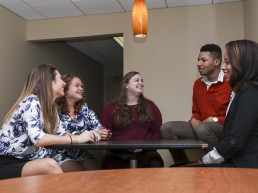Header photo: Chief Diversity, Inclusion and Talent Management Officer, Dr. James E. Taylor
Belonging — it’s something we all want and work towards. From children to adults, executives to first-time employees, every one of us wants to know that we belong. Belonging is more than a feeling we get; it affects how we live, work, interact, progress, and thrive. Belonging should not be a single brick in the structures we build and are a part of —it should be the foundation of better workplaces and communities. Belonging is not the end goal; it is where we begin.
At UPMC, we strive to ensure our employees not only feel that they belong, but know that they belong, that they matter, that their voices are being elevated to shape the future of health care. This happens by not just welcoming the talent and skills of our staff, but celebrating how the diversity and cultural expertise our team enhances the workplace. Having a diverse employee presence – at all levels – ensures we have the knowledge, critical thinking, agility, and innovation required of a health system that leads well now and works towards building a better future.
UPMC has been home to many firsts in medical science, and we’re proud to continue leading the way as an innovator in every aspect of caregiving. But we can only do it with the right people and the right foundation. This means caring for our workforce in ways that help them feel and know they belong and extending that culture to our patients and communities, too.
“A diverse population puts us in a better position to navigate change because diversity leads to better decisions.”
John Galley, Senior Vice President, Chief Human Resources Officer, UPMC
We’re working hard to make health care accessible to all patients and families, recognizing along the way that the care people need may differ for individuals from diverse backgrounds. UPMC’s Center for Engagement and Inclusion (CFEI) is the team that leads the charge in this work. But they don’t do this work alone, partnering with other nonprofit organizations, charitable foundations, and religious groups. By involving community leaders and inviting them to be part of the process, CFEI is able to better identify and address critical needs that bring meaningful changes that help our communities become even healthier, stronger, and safe while also keeping UPMC accountable to being a place where belonging is the foundation.
So what does that work actually look like? These are just a few of the initiatives UPMC engages in through the CFEI to advance our mission to be a diverse and inclusive organization:
Supporting Diverse Nonprofits in Our Communities
CFEI partners with our corporate teams to provide charitable giving sponsorship support to various diverse nonprofit organizations in our communities, strengthening our commitment to collaborate with diverse community organizations. In 2020 alone, CFEI was able to sponsor over 100 diverse nonprofit organizations.
Partnering in Community Health
The Community Health Partnership Council works to make Pittsburgh a healthier place for our diverse communities as they address health disparities and neighborhood needs. The Council acts on issues impacting our communities, fosters productive conversation and feedback from our community members on CFEI programs to ensure the best benefit and use of resources, and provides underserved areas with educational health resources.
Listening & Engaging with Employee Feedback
Following the tragic loss of George Floyd, Ahmaud Arbery, and Breonna Taylor, John Galley, Senior Vice President and Chief Human Resources Officer, and Dr. James E. Taylor, Chief Diversity, Inclusion, and Talent Management Officer gathered leaders across our organization to listen, engage, and enact change at UPMC. This group is working to address:
- Recruitment and onboarding
- Community outreach and education
- Employee experience
- Leadership/management accountability
Addressing Health Inequalities & Disparities
Leslie Davis, President and CEO of UPMC, and Diane Holder, Executive Vice President of UPMC, Chief Executive Officer, President of UPMC Health Plan and President of the Insurance Services Division joined forces to lead an Executive Health Disparities Committee. This committee works closely with community leaders and free clinical service providers in predominantly Black neighborhoods to address these health inequalities through clinical support and expertise from UPMC. Their focus is on providing clinical support to address the top three health disparities outlined in the Pittsburgh Inequality Report:
- Maternal and infant mortality
- Cardiovascular disease
- Primary care access
Advancing LGBTQ+ Health Care Equality
In its 13th year, the Healthcare Equality Index (HEI) is the national LGBTQ+ benchmarking tool that evaluates health care facilities’ policies and practices related to the equity and inclusion of their LGBTQ+ patients, visitors, and employees. In 2020, UPMC was recognized as a Leader in LGBTQ+ Healthcare Equality.
Youth Programs & Mentorship
Junior Health Care Explorers, in partnership with the University of Pittsburgh School of Health Sciences, is a youth STEM program consisting of workshops for middle school students to begin their career exploration in the health care industry. Additionally, UPMC partners with Reading is FUNdamental (RIF), a reading mentorship program that paired 29 UPMC corporate and Health Plan employees with students from the Manchester Academic Charter School.
UPMC Ambassadors
Developed to tackle health disparities in our communities, UPMC Ambassadors are employee volunteers from underrepresented communities that attend local events and support their communities.




